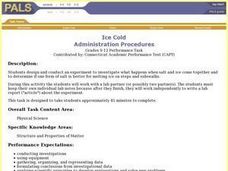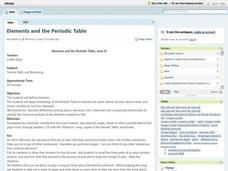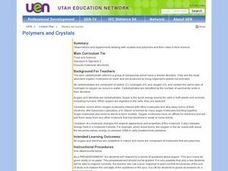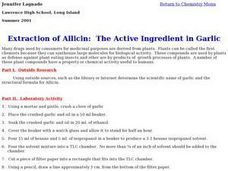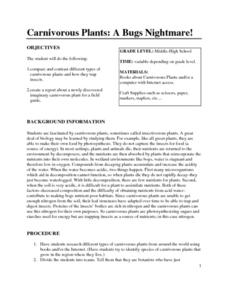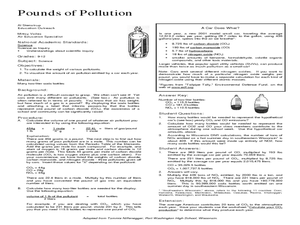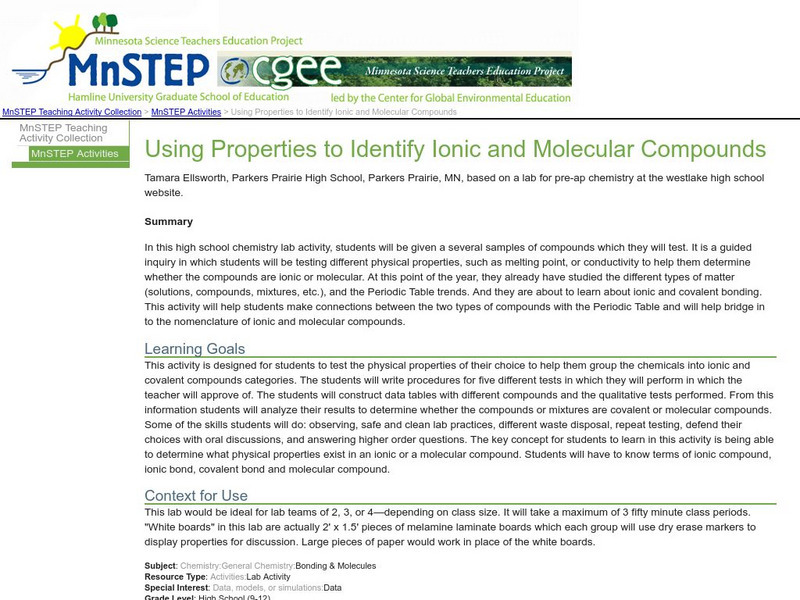Curated OER
Ice Cold
Students design and conduct an experiment to investigate what happens when salt and ice come together and to determine if one form of salt is better for melting ice on steps and sidewalks.
Curated OER
Pyrotechnics for Pyromaniacs
Students explore how chemistry is associated with the annual celebration of America's independence. They learn what gunpowder is made of, the anatomy of a firework, how noise is made in fireworks and the safety issues.
Curated OER
Circle of Life
Students consider why we eat and where our food obtains its energy. They illustrate food chains that might be found on an open field, dissect owl pellets, identify the remains of animals in the pellets, watch videos and participate in...
Curated OER
The Nature Of Dissolving Processes
Students examine the rule of "like dissolves like." They define and describe solutions and solubility models on molecular liquids, ionic solids, and molecular solids.
Curated OER
Effects of Acid Rain
Third graders explore the concept of acid rain and its effects on ecosystems. They are placed in groups and using a graphic organizer they brainstorm their ideas about what would happen to the ecosystems living within these environments...
Curated OER
Elements and the Periodic Table
Students are introduced to the elements on the Periodic Table and what is meant by element. Using the Table, they identify the name, atomic mass, number and symbol of each element. To end the instructional activity, they discover the...
Curated OER
How do plant & animal cells make and use energy?
Pupils show the relationship between the need for plants to undergo photosynthesis in order to generate oxygen. They see the flaws associated with this thinking because of the lack of CO2 and H2O and lack of sufficient gravity in order...
Curated OER
Polymers and Crystals
Students experiment with crystals and polymers and examine their roles in food science.
Curated OER
A Solution for Moles
Students calculate the concentration of different solutions. In this chemistry lesson, students explain what a solution is. They explain ways to change the concentration of a solution.
Curated OER
Ions in the Environment
Students explain the importance of the five main biogeochemical cycles. In this chemistry lesson, students discuss how ions are transported in the environment. They design an experiment to collect data on eutrophication.
Curated OER
Extraction of Allicin: The Active Ingredient in Garlic
Students conduct research to determine the structural formula for Allicin, a component of garlic. They participate in a lab to extract Allicin from garlic and complete a set of questions about their work.
Curated OER
Atoms, Kinetic Theory, Solids and Fluids
Students identify and describe the building blocks that make up an atom. They also compare the ages of atoms to the ages of the materials they compose,as well as, give examples that illustrate the small size of atoms.
Curated OER
Urban Impact on Chollas Creek (California): A Field Study
Students, in groups, take samples from a creek and keep a field journal on their samples. They also perform tests on their samples.
Curated OER
Carnivorous Plants: A Bugs Nightmare!
Students research carnivorous plants and how they trap insects. They role play as botanists to write a research field guide about a newly discovered imaginary carnivorous plant.
Curated OER
Ozone Pollution: Smog Alert
Students simulate the development of smog. They discover how it forms naturally in nature. They read news articles about the ozone and pollution. They discuss what they can do to lower the pollution they generate.
Curated OER
Pounds of Pollution
Students examine pollutants and investigate air pollution emitted by a car in a year. In this air pollution lesson plan students complete an activity and make calculations.
Curated OER
Revised “Understanding Nutrition” Activity
Students evaluate their current food choices. In this health science lesson, students test different drinks to rate the amount of Vitamin C content. They discuss results in class.
Science Education Resource Center at Carleton College
Serc: Using Properties to Identify Ionic and Molecular Compounds
A guided inquiry in which students test different physical properties, such as melting point or conductivity, to help them determine whether the compounds are ionic or molecular.
American Chemical Society
Middle School Chemistry: Represent Bonding With Lewis Dot Diagrams
Learners draw and interpret Lewis dot diagrams for individual atoms and both covalent and ionic compounds.
Other
Science Alive: The Many Faces of Steroids
This reading is an introduction to the great variety of steroids and their many different uses.
McREL International
Mc Rel: Glue Polymer (Whelmer #15 Learning Activity)
An easy to do activity that investigates the basic principles behind chemical bonding. The activity is written in lesson plan format that meets NSES standards.
Other
Science Alive: What Is Organic Chemistry?
This reading/lesson plan introduces students to the concept of organic chemistry.
Other
Science Alive: Synthetic vs. Natural: What's the Difference?
Through this reading, students will learn that a substance's properties arise from its molecular structure, not from how it's made (i.e., synthesized by people or found in nature). There is no fundamental difference between natural and...
Other popular searches
- Molecules and Compounds
- Compounds and Molecules Labs
- Chemical Compounds Molecules
- Elements Molecules Compounds
